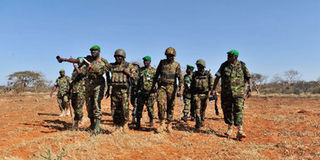Plans to convert Amisom troops into peacekeepers in advanced stage

Amisom Deputy Force Commander for Support and Logistics, Major-General Nakibus Lakara, tours a Kenyan Defence Forces base camp in el-Ade, a town in the southwestern Gedo region of Somalia, on January 22, 2016. PHOTO | ABDISALAN OMAR | AMISOM
What you need to know:
- President Uhuru Kenyatta and UN Secretary-General Ban Ki-moon expected to sign deal this week.
BRUSSELS
Plans to convert the African Union Mission in Somalia (Amisom) troops into a United Nations peacekeeping force are in an advanced stage.
The deal is set to be finalised during a meeting this week between President Uhuru Kenyatta and United Nations (UN) Secretary-General Ban Ki-moon in Brussels, Belgium.
Kenya’s Ambassador to Belgium and the European Union (EU), Johnson Weru, said on Tuesday that the talks to transform Amisom started last year.
President Kenyatta is expected in Brussels on Wednesday at the invitation of EU President Donald Tusk to address a post–United Nations General Assembly meeting on Sustainable Development Goals adopted last year.
However, on the sidelines of the meeting, efforts will be made by the UN and the EU to reduce the burden of Amisom forces on the Horn of Africa countries in a last-ditch attempt to convince Kenya to rethink its decision to close Dadaab, the largest refugee camp complex in the world.
There is growing international thinking, that Kenya has denied, that the Jubilee administration decided to close Dadaab in a bid to armtwist Western powers to increase funding for Amisom. This was after the EU, the main financier, cut its contribution by 20 per cent.
“The EU decision to cut funding to Amisom reduced its effectiveness because the soldiers’ stipend also went down,” said Mr Weru.
Though President Kenyatta has used international and UN forums to argue for more funding for Amisom, he has been categorical that the closure of Dadaab is for security and environmental reasons, and not money.
Last month, Deputy President William Ruto told a humanitarian summit in Istanbul that Kenya has been spending Sh10 billion ($100 million) of its own money on the needs of refugees.
Last week, he told 20 ambassadors from EU member states in Nairobi that Kenya would not rethink its decision and urged the international community to help return the more than 500,000 Somali refugees home in a year.
Mr Ban has in the past urged Kenya to rethink its decision, while international lobbies and agencies have warned that the Jubilee administration would be breaching international laws by returning the refugees to Somalia against their will.
Somalia President Hassan Sheikh Mohamud and UN High Commissioner for Refugees Fillipo Randi have recently visited Kenya over the planned closure of the camp.
On Tuesday, Mr Weru said after he informed the EU member states of Kenya’s decision to close the camp, Western powers turned to the AU to seek its intervention.
“After I transmitted a diplomatic note from (Interior) Permanent Secretary Karanja Kibicho, nobody has come to me but a lot of inquiries have been made to our ambassador at the African Union in Addis Ababa,” he said.





